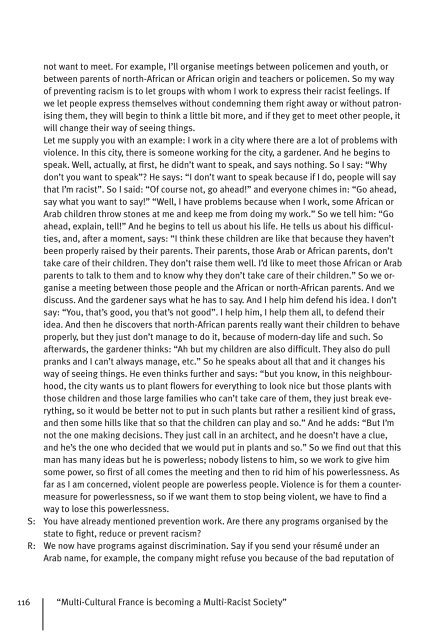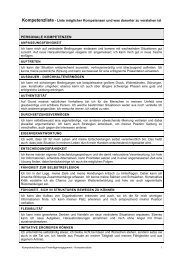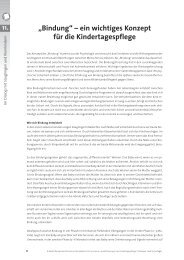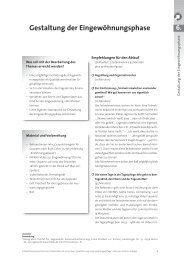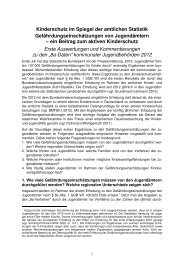Prevention of Right-Wing Extremism, Xenophobia and Racism in ...
Prevention of Right-Wing Extremism, Xenophobia and Racism in ...
Prevention of Right-Wing Extremism, Xenophobia and Racism in ...
You also want an ePaper? Increase the reach of your titles
YUMPU automatically turns print PDFs into web optimized ePapers that Google loves.
not want to meet. For example, I’ll organise meet<strong>in</strong>gs between policemen <strong>and</strong> youth, or<br />
between parents <strong>of</strong> north-African or African orig<strong>in</strong> <strong>and</strong> teachers or policemen. So my way<br />
<strong>of</strong> prevent<strong>in</strong>g racism is to let groups with whom I work to express their racist feel<strong>in</strong>gs. If<br />
we let people express themselves without condemn<strong>in</strong>g them right away or without patron-<br />
is<strong>in</strong>g them, they will beg<strong>in</strong> to th<strong>in</strong>k a little bit more, <strong>and</strong> if they get to meet other people, it<br />
will change their way <strong>of</strong> see<strong>in</strong>g th<strong>in</strong>gs.<br />
Let me supply you with an example: I work <strong>in</strong> a city where there are a lot <strong>of</strong> problems with<br />
violence. In this city, there is someone work<strong>in</strong>g for the city, a gardener. And he beg<strong>in</strong>s to<br />
speak. Well, actually, at fi rst, he didn’t want to speak, <strong>and</strong> says noth<strong>in</strong>g. So I say: “Why<br />
don’t you want to speak”? He says: “I don’t want to speak because if I do, people will say<br />
that I’m racist”. So I said: “Of course not, go ahead!” <strong>and</strong> everyone chimes <strong>in</strong>: “Go ahead,<br />
say what you want to say!” “Well, I have problems because when I work, some African or<br />
Arab children throw stones at me <strong>and</strong> keep me from do<strong>in</strong>g my work.” So we tell him: “Go<br />
ahead, expla<strong>in</strong>, tell!” And he beg<strong>in</strong>s to tell us about his his life. He tells us about his his diffi cul-<br />
ties, <strong>and</strong>, after a moment, says: “I th<strong>in</strong>k these children are like that because they haven’t<br />
been properly raised by their parents. Their parents, those Arab or African parents, don’t<br />
take care <strong>of</strong> their children. They don’t raise them well. I’d like to meet those African or Arab<br />
parents to talk to them <strong>and</strong> to know why they don’t take care <strong>of</strong> their children.” So we or-<br />
ganise a meet<strong>in</strong>g between those people <strong>and</strong> the African or north-African parents. And we<br />
discuss. And the gardener says what he has to say. And I help him defend his idea. I don’t<br />
say: “You, that’s good, you that’s not good”. I help him, I help them all, to defend their<br />
idea. And then he discovers that north-African parents really want their children to behave<br />
properly, but they just don’t manage to do it, because <strong>of</strong> modern-day life <strong>and</strong> such. So<br />
afterwards, the gardener th<strong>in</strong>ks: “Ah but my children are also diffi cult. They also do pull<br />
pranks <strong>and</strong> I can’t always manage, etc.” So he speaks about all that <strong>and</strong> it changes his<br />
way <strong>of</strong> see<strong>in</strong>g th<strong>in</strong>gs. He even th<strong>in</strong>ks further <strong>and</strong> says: “but you know, <strong>in</strong> this neighbour-<br />
hood, the city wants us to plant fl owers for everyth<strong>in</strong>g to look nice but those plants with<br />
those children <strong>and</strong> those large families who can’t take care <strong>of</strong> them, they just break eve-<br />
ryth<strong>in</strong>g, so it would be better not to put <strong>in</strong> such plants but rather a resilient k<strong>in</strong>d <strong>of</strong> grass,<br />
<strong>and</strong> then some hills like that so that the children can play <strong>and</strong> so.” And he adds: “But I’m<br />
not the one mak<strong>in</strong>g decisions. They just call <strong>in</strong> an architect, <strong>and</strong> he doesn’t have a clue,<br />
<strong>and</strong> he’s the one who decided that we would put <strong>in</strong> plants <strong>and</strong> so.” So we fi nd out that this<br />
man has many ideas but he is powerless; powerless; nobody listens to him, so we work to give him<br />
some power, so fi rst <strong>of</strong> all comes the meet<strong>in</strong>g <strong>and</strong> then to rid him <strong>of</strong> his powerlessness. As<br />
far as I am concerned, violent people are powerless people. Violence is for them a counter-<br />
measure for powerlessness, so if we want them to stop be<strong>in</strong>g violent, we have to fi nd a<br />
way to lose this powerlessness.<br />
S: You have already mentioned prevention work. Are there any programs organised by the<br />
state to fi ght, reduce or prevent racism?<br />
R: We now have programs aga<strong>in</strong>st discrim<strong>in</strong>ation. Say if you send your résumé under an<br />
Arab name, for example, the company might refuse you because <strong>of</strong> the bad reputation <strong>of</strong><br />
116 “Multi-Cultural France is becom<strong>in</strong>g a Multi-Racist Society”


